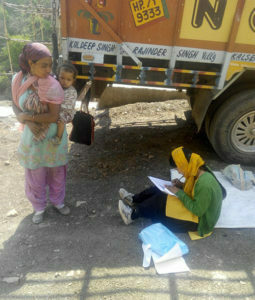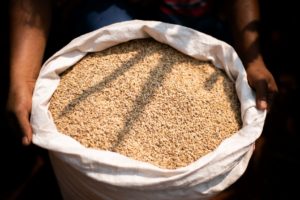This article was published more than 4 years ago.
October 16 is World Food Day. It comes at a time when food security—people’s ability to access enough nutritious food—is a growing global concern. Mostly as a result of COVID-19, The UN’s World Food Program estimates that by the end of 2020, the number of people facing life-threatening hunger is likely to double to 265 million people.
Food security is a basic human right. And it’s one that Fund-supported activists have worked to advance for years. Check out three groups that, with the Fund’s support, are ensuring families and communities do not go hungry.

In northern India, Association of Strong Women Alone of Himachal Pradesh (Ekal Nari Shakti Sanghtan Himachal Pradesh, or ENSS-HP) secured a critical legal victory that helped Nepali migrant workers obtain much-needed food aid. When the pandemic hit, this women’s rights group identified 59 laborer families who had been unjustly denied grain and other emergency supplies. Despite living and working in India for up to 40 years, the workers and their families lacked paperwork required to access the government’s COVID assistance program. ENSS-HP brought their case to local courts—and won. The victory enabled the laborers and their children to receive food packages and ENSS-HP has continued working to ensure other migrant families do not go hungry.

In the Philippines, Convergence of Initiatives for Environmental Justice, Inc. (CIEJ) shifted its focus from mobilizing indigenous communities to protect natural resources and their way of life to safeguarding their health and well-being during COVID-19. By collaborating with their network of community leaders, CIEJ organized an initial distribution of rice, followed by 800 boxes of vegetables, to those living in hard-to-reach areas. They then helped create longer-term strategies for boosting food security, including the planting of robust, sustainable crops. Their first harvest, sweet potatoes, is set for this month.

In Honduras, OFRANEH is taking collective action to promote sustainable agriculture and the rights of the Garifuna, a community of Afro-indigenous peoples. As the pandemic moved into Central America, OFRANEH was prepared. They built on experience and tradition to establish olla communitaria, or “community pot” in nearly 20 Garifuna communities. This response was more rapid than the government’s and the model was so effective that other Honduran organizations adapted it.
The Fund proudly supports these and nearly 300 other community-based organizations offering powerful solutions to meet people’s urgent needs and protect their rights during and beyond the pandemic.